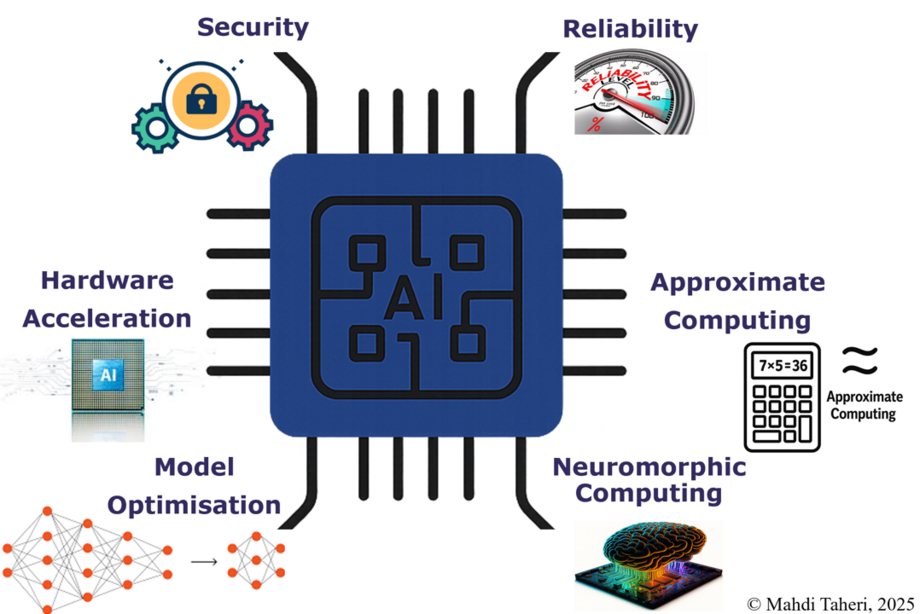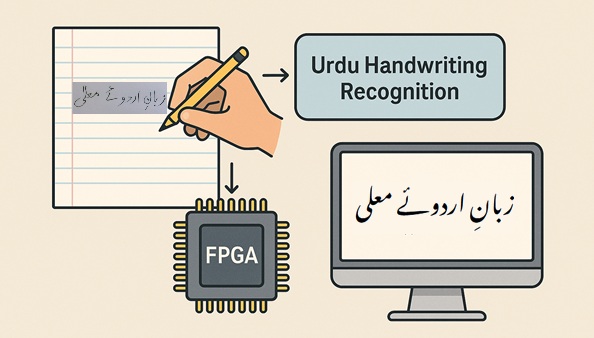Abschlussarbeiten
Das Fachgebiet Technische Informatik bietet Stundenten die Möglichkeit Abschlussarbeiten in den Bereichen FPGA, 5G, Videokommunikation und integrierte Schaltungen und zu bearbeiten. Für detailiertere Informationen zu aktuellen Aufgabenstellungen und zu Forschungsthemen wenden Sie sich bitte direkt an die entsprechenden Mitarbeiter.
Offene Themen

Gestalten Sie die Zukunft der KI – Themen für Masterarbeiten verfügbar
Type: Masterarbeit
Betreuer:Dr. Mahdi Taheri
Kontakt:taheri(at)b-tu.de
Website: https://www.b-tu.de/en/technische-informatik/team/mitarbeiter/senior-mitarbeiter/dr-mahdi-taheri
Beschreibung:
Es stehen Masterarbeitsthemen in mehreren zentralen Bereichen der modernen künstlichen Intelligenz und KI-Hardware zur Verfügung, darunter:
KI-Sicherheit
Hardwarebeschleunigung für KI (FPGA, Softcore-GPU/FGPU)
Zuverlässigkeit von KI-Systemen
Approximate Computing
Neuromorphes Rechnen (SNN)
Modelloptimierung (Pruning, Quantisierung, LLM-/Transformer-Optimierung)
Der Schwerpunkt der Arbeiten liegt auf der Entwicklung und Optimierung fortgeschrittener KI-Modelle wie Transformern und LLMs sowie der Gestaltung energieeffizienter, zuverlässiger und sicherer Hardwarebeschleuniger. Forschungsrichtungen umfassen hardwarebewusste Optimierung, fehlertolerante Architekturen, Approximate-Computing-Methoden, neuromorphes Rechnen und Modellkompression für Edge-AI und sicherheitskritische Anwendungen.
Eigene Themenvorschläge sind ebenfalls verhandelbar.
Termine können ausschließlich per E-Mail vereinbart werden.
---------------------------------------------------------------------------------------------------

3D-fusionierte Multiview-3D-Bilder aus nur einer einzigen Ansicht
Titel: Erstellung von Einzelbild- zu fusionierten Multibild-Lichtblattbildern mit Deep Learning
Typ: Bachelorarbeit
Betreuer: Alireza Siyavashi, Dr.-Ing. Christian Herglotz
Kontakt: siyavash@b-tu.de
Beschreibung: Ziel ist die Weiterentwicklung von Methoden zur 3D-Bildfusion mittels Deep Learning in Biologie und Mikroskopie. Ziel ist die Vorhersage eines fusionierten 3D-Bildes aus nur einer 3D-Ansicht unter Berücksichtigung der Einschränkungen aktueller Mikroskopietechniken wie Lichtexposition und Probenschädigung. Dies verbessert die Bildqualität, verlängert die Live-Bildgebungsdauer, spart Photonenbudget und verbessert die Bildanalyse, insbesondere bei großen biologischen Proben. Die Herausforderung besteht in der Entwicklung robuster Open-Source-Methoden mit hoher Datenvariabilität.
Erforderliche Kenntnisse:
- Deep Learning für die Bildverarbeitung
- 3D-Bildgebungsverfahren und tiefes Verständnis von Voxel- und Gitternetzwerken
- Bildfusions- und -wiederherstellungsmethoden
- Programmierung (Python, TensorFlow oder ähnliches)

Implementierung einer Videodekodierungshardware
- Titel: Implementierung einer Videodekodierungshardware
- Typ: Bachelor Thesis
- Supervisor: Dr.-Ing. Christian Herglotz
- Beschreibung:
Videodateien sind in der Regel sehr groß. Um sie praktisch nutzen zu können, wurden Komprimierungsstandards wie H.264 definiert, die deutlich reduzierte Bitraten bei akzeptabler Bildqualität ermöglichen. Leider ist die Komprimierung sehr komplex. Verschaffen Sie sich einen Überblick über die Funktionsweise dieses Standards, testen Sie ihn auf Softwareebene und beschleunigen Sie ihn später durch die Implementierung auf einer Hardwareplattform (insbesondere FPGA). Die Leistung sowohl der Software als auch der Hardware sollte bewertet werden, damit die Beschleunigung der Hardwarelösung deutlich wird.
Benötigte Fähigkeiten:
- Solide Kenntnisse im grundlegenden Hardware-Design (idealerweise mit FPGAs)

Herausforderungen bei der Implementierung des Digitalen Zwillings für 5G-Infrastrukturen
Titel: Herausforderungen bei der Implementierung des Digitalen Zwillings für 5G-Infrastrukturen
Typ: Masterarbeit
Supervisor: Dr. Hamid Zargariasl
Beschreibung:
Die Implementierung digitaler Zwillinge für 5G steht vor mehreren Herausforderungen, insbesondere im Umgang mit der enormen Menge an generierten Daten und der Sicherstellung einer Kommunikation mit geringer Latenz. Die Integration verschiedener Technologien wie Antennentechnik, Funkfrequenzen, Computernetzwerke, IoT und KI erfordert eine nahtlose Interoperabilität sowie standardisierte Rahmenbedingungen. Zudem ergeben sich Sicherheits- und Datenschutzprobleme aufgrund des sensiblen Datenaustauschs zwischen physischer und digitaler Umgebung. Darüber hinaus stellen die hohen Infrastrukturkosten und die begrenzte Expertise im Bereich fortgeschrittener 5G- und Digital-Twin-Technologien weitere Hürden dar.
- Erforderliche Kenntnisse:
- Grundkenntnisse der Mobilkommunikation und zellularer Netzwerke
- Grundkenntnisse der Computernetzwerke
Rauschunterdrückung und Signalverbesserung

- Titel: Entwicklung von AI-basierten oder adaptiven Filtertechniken zur Rauschunterdrückung in Ultraschallsignalen
- Typ: Master Thesis
- Supervisor: M.Sc. Priscile Suawa Fogou
- Beschreibung:
Ultraschallsignale sind in industriellen, medizinischen und sensorischen Anwendungen weit verbreitet. Diese Signale leiden jedoch häufig unter Hintergrundrauschen und Störungen, die die Genauigkeit und Zuverlässigkeit beeinträchtigen können. Herkömmliche Filtermethoden wie Bandpassfilter oder Wavelet-Transformationen sind bei komplexen Rauschmustern nur begrenzt einsetzbar. Dieses Thema zielt darauf ab, KI-basierte und adaptive Filtertechniken zu erforschen, um die Klarheit und Präzision von Ultraschallsignalen zu verbessern, indem unerwünschtes Rauschen dynamisch reduziert wird.
- Benötigte Fähigkeiten:
- Grundkenntnisse der Signalverarbeitung
- Maschinelles Lernen
- Programmierung (idealerweise Python)
FPGA-beschleunigte Urdu-Handschrifterkennung

- Title: Urdu-Handschrifterkennung auf FPGA: Nutzung paralleler Verarbeitungsressourcen
- Type: Masterarbeit
- Supervisor:Muhammad Amin Qureshi
- Description: Urdu ist eine weit verbreitete südasiatische Sprache, die vor allem in Pakistan und Indien gesprochen wird. Ihre Schrift ist vom Arabischen und Persischen abgeleitet und enthält einzigartige stilistische und strukturelle Elemente. Obwohl sie phonetische Ähnlichkeiten mit Hindi aufweist, wird die Urdu-Schrift kursiv und von rechts nach links geschrieben, was sie für die automatische Erkennung deutlich komplexer macht. Die Erkennung von Urdu-Handschriften ist eine komplexe, aber wichtige Aufgabe im Bereich der Mustererkennung und des maschinellen Lernens, die in der digitalen Archivierung, der automatisierten Dokumentenverarbeitung und bei unterstützenden Technologien Anwendung findet. Dieses Projekt konzentriert sich auf die Implementierung eines effizienten Urdu-Handschrifterkennungssystems auf einem FPGA (Field-Programmable Gate Array), wobei dessen parallele Verarbeitungsmöglichkeiten für Echtzeit- und Hochgeschwindigkeitsberechnungen genutzt werden. Urdu hat 39 verschiedene Zeichen und mit einigen Variationen steigt diese Zahl auf 52 an. Da es sich um eine Schreibschrift handelt, bestehen etwa 26.000 Ligaturen aus diesen Zeichen. In diesem Bereich wurde viel gearbeitet, aber die Implementierung auf einem eingebetteten System, insbesondere auf einem FPGA, ist kaum vorhanden. Das Ziel dieses Projekts ist es, ein System zu entwickeln, das handgeschriebenen Urdu-Text genau erkennen kann, und seine Leistung mit FPGA-basierter Hardwarebeschleunigung zu bewerten. Einige der Arbeiten in der Literatur sind unten aufgeführt.
- https://doi.org/10.1007/s11265-013-0848-x
- doi.org/10.1109/IBCAST59916.2023.10712987
- https://doi.org/10.1007/978-3-031-41685-9_8
- doi.org/10.1109/Deep-ML.2019.00021
- doi.org/10.1109/ICDAR.2017.30
- doi.org/10.1109/ACCESS.2022.3144844
- doi.org/10.1109/ACCESS.2020.3010166
- https://doi.org/10.1007/978-3-031-41734-4_19 (Git: abdur75648/UTRNet-High-Resolution-Urdu-Text-Recognition: UTRNet: High-Resolution Urdu Text Recognition In Printed Documents (ICDAR'23))
- Benötigte Fähigkeiten:
- Traditionelles Maschinelles Lernen (HOG, SIFT usw.)
- Deep Learning (CNN, LSTM)
- Python
- FPGA-Implementierung mit Verilog/VHDL und HLS
